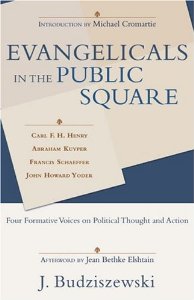Evangelicals in the Public Square
 J. Budziszewski, et al., Evangelicals in the Public Square: Four Formative Voices on Political Thought and Action (Grand Rapids: Baker Academic, 2006), 218 pages, ISBN 9780801031564.
J. Budziszewski, et al., Evangelicals in the Public Square: Four Formative Voices on Political Thought and Action (Grand Rapids: Baker Academic, 2006), 218 pages, ISBN 9780801031564.
J. Budziszewski is professor of philosophy and government at the University of Texas at Austin, and has written a number of well-recognized books on political theory, politics and virtue ethics, tolerance and liberalism, and natural law ethics, among other topics. For the project which formed the backbone to this book, a conference was sponsored by the Ethics and Public Policy Center in Prouts Neck, Maine, in September of 2003, where initial drafts of the essays published here were presented. In this review, I will summarize the book’s structure and arguments, briefly explicate on the central dilemma plaguing the formation of an evangelical political theology, and comment on why these matters are of relevance also to Pentecostal and charismatic Christians today.
After a short introduction by Michael Cromartie of the Ethics and Public Policy Center, the two lead essays by Budziszewski, which constitute more than half of the book, lay out the basic issues and set the tone of discussion for the volume. In the first essay, Budziszewski suggests that one major reason why evangelicals have not yet developed a robust political theology is that their commitments to grounding any theological agenda biblically do not work well with the fact that there are insufficient biblical guidelines for such a task. In fact, political theology needs a more hearty acknowledgment of the role of general revelation precisely in order to provide a theological justification for evangelical engagement in matters related to the wider public square, as well as theological guidelines for how evangelicals might concretely proceed. But, as Budziszewski then attempts to show in his second longer essay on the four formative thinkers announced in the book’s subtitle–Carl F. H. Henry, Abraham Kuyper, Francis Schaeffer, and John Howard Yoder — evangelical hesitation about embracing this particular theological idea (of general revelation) further complicates their already difficult task. In Budziszewski’s analysis, the political theology each of these evangelical thinkers suffers because they falters at key points in their projects with regard to the doctrine of general revelation: Henry is hampered by a nagging premillennial and dispensationalist defeatism in addition to an ambivalence about the (perhaps all to Catholic) idea of general revelation; Kuyper by an underdevelopment of his ideas of common grace, sphere sovereignty (of the state, society, and the church), and principled pluralism; Schaeffer by an unbalanced emphasis on apologetics which in turn neglected the pragmatic dimensions of engaging the public square, as well as by his acceptance of the presuppositionalist school of apologetics along with its suspicion regarding general revelation; and Yoder by a sectarian and countercultural orientation which is not predisposed to exploring the continuities between Christians and non-Christians, even for the purposes of public engagement. As a result, these four evangelical theologians, as formative as any for evangelical thought and action, have been unable to bequeath to their descendents the much needed resources to more fully develop the kinds of orienting ideas, practical programs, and cultural apologetics needed for a more vibrant evangelical political theology today.
The remainder of the volume includes four essays by scholars responding to Budziszewski’s readings of these evangelical theologians and a concluding after word reflecting on the conference discussion as a whole. David Weeks, a Henry scholar and political science professor at Azusa Pacific University, attempts to provide a thicker description of Henry as an evangelical theologian as well as fill out, in dialogue with Henry, some of the details which Budziszewski has identified with regard to the formulation of an evangelical political theology. Similarly, John Bolt, a Kuyper scholar and systematician at Calvin Theological Seminary, basically agrees with Budziszewski’s remarks about Kuyper, but provides a further elaboration of how the Kuyperian theological vision can be reappropriated in the service of evangelical thought and political action. Not surprisingly, William Edgar, a presuppositionalist philosopher and theologian at Westminster Theological Seminary, responds to Budziszewski both by locating the larger socio-cultural, political, and theological framework of Schaeffer’s apologetics and by explicating how the logic of presuppositionalism leads to a different set of concerns that may be complementary rather than opposed to the logic derived from a commitment to the doctrine of general revelation. Finally, Ashley Woodiwiss, a political scientist at Wheaton College, responds that even if one cannot go all the way with Yoder, yet one must respect how his Anabaptist and Mennonite perspective informed his scholarship and produced vision of the gospel focuses on the church as an alternative politics, an distinctive praxis, and a subversive mode of cultural engagement, all of which combine to perhaps even undermine the received framework of questions concerning evangelicalism as well as political theology. The book concludes with Jean Bethke Elshtain’s (Laura Spelman Rockefeller Professor of Social and Political Ethics at the University of Chicago “A Friendly Outsider’s Reflections” (her title) on the entire exchange.
Category: In Depth


